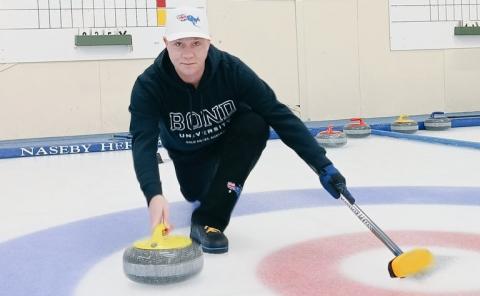
It’s a sport played on ice where a competitor brushes the frozen surface to steer a stone towards a zone called “the house”. So where else would the Australian champion live but here on the sunny Gold Coast?
To be fair, Bond University alumnus and Law faculty Semester Senior Teaching Fellow Jay Merchant learnt the craft of curling as a kid on the rinks of Alberta, Canada. And a couple of times a year he is forced to travel to New Zealand for training time on the ice.
This week Merchant, a veteran of the Antipodean curling scene, emerged victorious at the Australian National Curling Championships .
He describes the sport to his local mates as “aggravated lawn bowls” and it is one that may cross the radar of the average Aussie sports fan only during the Winter Olympics where Merchant hopes to compete.
Originally hailing from Coronation, a small rural town in Alberta, Merchant graduated with a Master of Business Law at Bond University in 2007.
In 2010 he returned to Bond to complete his Juris Doctor and while back in Australia was offered permanent residency under a distinguished talent visa, with an Olympic endorsement.
Merchant had a reputation from competing at national events in Canada, and given he was already studying at Bond, he was the obvious choice when the Australian Olympic Institute began exploring their options to expand their national curling representation.
“Once they got in contact with me things moved very quickly,” he said.
“I received my permanent residency within eight business days which is just unheard of.”
His distinguished talent visa, typically associated with professional sports like rugby and cricket, was also unheard of for a sport like curling.
For the past 13 years since he has represented Australia in national and international curling events, often training in Naseby, New Zealand, due to the absence of dedicated facilities in Australia or anywhere else in the Southern Hemisphere.
“Compared to other countries the training is very limited for us,” he said.
“But we do spend a lot of time overseas and New Zealand is the closest training ground, so we take at least two trips there each year.”
It was in New Zealand where the Australian National Curling Championships, featuring eight Aussie teams, took place and Merchant’s team went through undefeated.
The victory secured automatic qualification for the Pan Continental Curling Championships which will be held in October on familiar territory in Kelowna, British Columbia.
A successful performance there would grant them valuable points towards qualification for the 2024 Winter Olympics.
However training for these events poses a challenge for Australian curlers given they juggle work commitments.
Unlike international teams whose members are professionals, Australian athletes have limited access to not only specialised training facilities, but also financial resources within the sport.
The team’s ultimate goal is to represent Australia at the Olympics, an achievement that no Australian men’s team has ever accomplished.
“This is a really important year because China is sitting out of this one,” Merchant said.
“They’re usually one of our biggest competitors so if we want to go to the Olympics, this is the year to do it.”
Outside of his curling career, Merchant teaches constitutional law, administrative law, and other subjects, incorporating concepts from Canadian law into his classes.
He also works as a criminal law barrister, handling cases that involve criminal, domestic violence, migration, and constitutional matters.
“Not only did I study at Bond, but it also helped to facilitate my migration back in 2010,” he said.
“Outside of study and academia, there’s that tight knit family that’s really benefited me and it’s part of the reason why I’m now a lecturer at Bond.”

